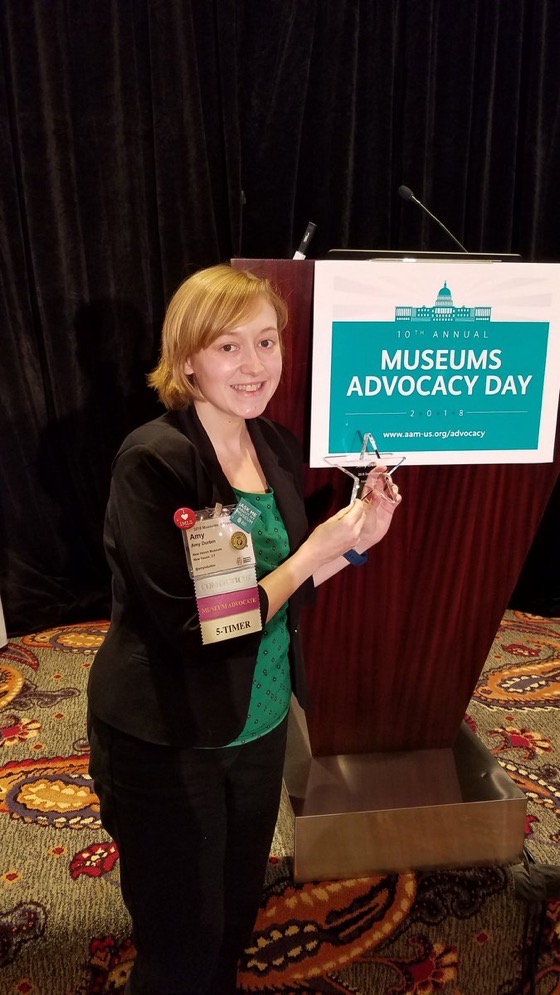.jpg)
On Feb. 27, Durbin and other museum advocates from across the country stormed the Hill to talk to legislators about museum funding. Here's why. Photos courtesy Amy Durbin.
Washington, D.C.—The museum is closed. Due to a lack of federal funding and charitable giving, we are sorry to say that museums across America have closed.
Scary thought, right? But it could happen.
It could happen so fast, and so easily, that I got on the 12:50 a.m. Amtrak to Washington earlier this week—for the 10th Museums Advocacy Day organized by the American Alliance of Museums (AAM). On Feb. 27, I gathered with museum advocates from around the country to rally for institutions. Let me tell you a little about what we did, and why we did it.
In the last two budget cycles, President Donald Trump has drastically cut funding, and even zeroed out agency needs, as part of his proposed budget. Despite his fatal fiscal figures, museums have actually been advocating for increased federal money for the last nine years.

Durbin on site.
As a museum professional, I have advocated on Capitol Hill for five years, visiting both Senate and House offices to make the ask: Please support funding for the Institute of Museum and Library Services (IMLS), the National Endowment for the Arts (NEA), the National Endowment for the Humanities (NEH), support Charitable Giving, support increased collaboration between IMLS and the U.S. Department of Education, support Historic Preservation, and support Species & Wildlife Conservation.
We make the same ask almost every year, verbatim. But not this year.
This year we came better prepared with all the data that Congress relies on when making decisions that affect the American people, and Congressional representatives’ chances at re-election. The data that we took to the Hill on Feb. 27 may have surprised Congressional aides, staffers, and members, but it wasn’t a surprise to the museum field.
Did you know? Museums directly support 726,200 jobs across the America. They also generate $50 billion (yes, with a B!) to the economy. Oh, and $12 billion in tax revenue. The numbers don’t lie. Museum are economic engines and it’s time Congress took note. According to the AAM, 97 percent of visitors to museums (94 percent non-visitors), and 95 percent of voters (96 percent non-voters) would approve of lawmakers who support museums. Across the political spectrum, as it turns out museums are not a partisan issue.
A few more numbers: 97 percent of those surveyed believe that museums are educational assets for their communities and 89 percent believe museums contribute important economic benefits to their community. Basically, we rock. So, why aren’t we rolling in the federal dough?
Last year, IMLS received grant applications for projects totaling $165 million, but was only able to fund $31 million of those projects. These grants go through a rigorous peer review process, because we aren’t going to throw money at projects that don’t meet the standards to which museums hold themselves. We are considered the most trusted source for information, and as such, we hold ourselves accountable.
We took to the Hill, all 350 of us museum advocates. I was part of the Connecticut delegation and we met with staff from every.single.office. We were even lucky enough to have facetime with three Congressional Representatives: John Larson (CT-01), Joe Courtney (CT-02), and Jim Himes (CT-04). They all support IMLS, NEA, and NEH.
Our two biggest challenges were ensuring that each office knew that IMLS needed to be reauthorized (its authorization ran out in 2017), and that the hot topic of charitable giving needed to be on their radar. Fun fact: tax incentives through charitable giving have been in place since 1917. Last year’s tax policy could take that all away and we urged each office to watch for the Universal Charitable Giving Act (H.R. 3938 and S.2123). Almost a third of museum budgets rely on charitable giving. If we lose IMLS, NEA, NEH, AND charitable giving, what’s left?
Overall, each office in the U.S. Senate and in the U.S. House of Representatives was visited by museum professionals throughout the day. We spent Monday going over facts and figures, working out our strategies to make our asks and tell our stories. We always began with a thank you and ended with “what do you need from us to help with these issues?”
Now, I’d like you to take a moment and think about your most meaningful museum memory. Say it out loud (or at a soft whisper), share that memory with your friend or a co-worker. Think about what you can do to ensure that future generations have the opportunity to have meaningful museum memories too.
Museums are mighty. Museums matter. Museums are stronger together.